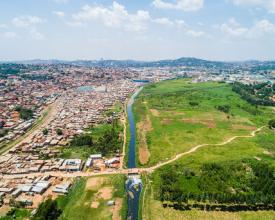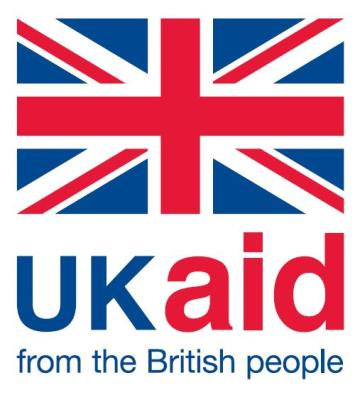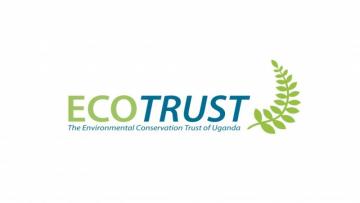
Engaging business for sustainable sugar production in Uganda
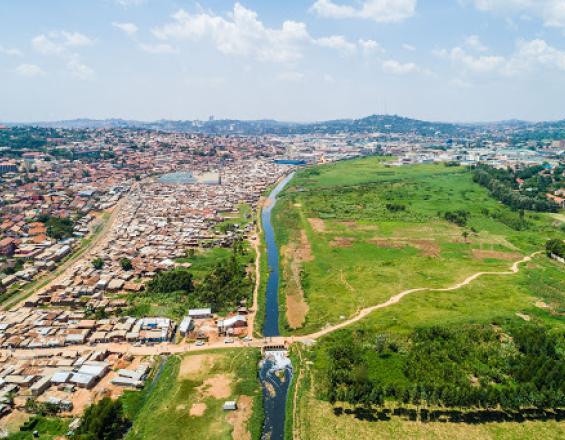
Kinyara Sugar Works Ltd. is a Ugandan business that produces sugar and grows sugar cane on its estate. Due to increasing demand, Kinyara sought to expand their sugar cane out-grower scheme, which, in addition to the impacts of a growing population, would threaten biodiversity and water resources of the Kiiha watershed, and community livelihoods. Ecotrust provided research to Kinyara on the sustainability threat to their value chain, which depends on water resources. Remedial actions would need to go beyond their nucleus estate; they should consider engaging with outgrowers and the local community on environmental and biodiversity actions. Kinyara now focuses on production efficiency rather than expansion, financially supports community-led restoration efforts, and has adopted the State-led Kiiha Catchment Management Plan for sustainable production and investments. They also signed an agreement, facilitated by Ecotrust, with Kiiha-dependent communities to develop alternative livelihoods.
Context
Challenges addressed
One of the main challenges in engaging Kinyara was to ensure that sustainable production intervention would need to go beyond the nucleus farm boundary. For this, a strategy was required that reconciles nature, community well-being, and profits both on and beyond the business-owned farm. Ecotrust was able to take actions that simultaneously addressed the risks that Kinyara’s supply chain, Kiiha’s biodiversity, and communities were facing.
Secondly, working with communities to develop alternative livelihoods and help them understand the importance of protecting nature in their area ensures that their well-being and needs are being met in a sustainable manner without degrading nature and affecting the business’ production.
Location
Process
Summary of the process
Both the Kiiha partnership and the Kiiha Catchment Plan provided fertile ground for Ecotrust to engage and support Kinyara, while lessons learned and the research done in the framework of the SRJS Programme, helped the NGO present convincing elements for transforming Kinyara’s practices, subsequently increasing their influence on Kinyara’s practices.
Building Blocks
A conducive environment
The Kiiha partnership initiated by the Ugandan Directorate of Water Resources Management, which gathered the department, GIZ, Kinyara, and Ecotrust, helped to create a dialogue platform that fostered research. This in turn helped inform discussions, recommendations and solutions to address sustainability risks to sugarcane production and development while considering different needs and perspectives. The partnership also helped Ecotrust engage more easily with Kinyara. In addition, the Kiiha Catchment Management Plan provides an obligation and roadmap for businesses in the target area to ensure that their practices are sustainable, and allows for further potential collaboration between civil society and business.
Enabling factors
- Parties willing to engage in dialogue and expand their knowledge on biodiversity issues and solutions, and consider other stakeholders’ needs and perspectives
- Trust-building between the various parties
Lesson learned
Dialogue helps to consider various needs and perspectives, and raise questions and issues that can better guide research, which in turn can demonstrate need for action.
Skills in business strategy
During the business engagement training given through the Shared Resources, Joint Solutions programme, civil society organisations furthered their knowledge about positioning, negotiation and dialogue. For example with regards to positioning, at first, Ecotrust thought about incentivising Kinyara to fulfil the requirements of and attain the BonSucro standard; a survey even showed that Kinyara was actually not too far off requirements. However, Ecotrust understood that the standard is a market incentive and helps a business access a market that it could not reach before; in the case of Uganda, the sugar industry is very much protected, so there is no added value in being certified as the price would remain the same. This led Ecotrust to switch strategies.
Enabling factors
- Creating a learning space for civil society to share knowledge and best practices for increased business engagement impact while considering while considering existing capacities, networks and needs.
- Willingness to learn and share more ways to influence business
Lesson learned
- It is very important for a civil society organisation to be cognisant of the context in which it is operating in, in order to tailor its business engagement strategy
- It is necessary to come to the table with credible information and convincing arguments
- Stakeholder mapping is paramount to effective partnerships
Research/Risks and Gaps Analysis
The research that Ecotrust and the Kiiha partnership undertook was quintessential in understanding the context they were operating in and the risks that the company faced, which allowed them to frame their business engagement approach, argument, strategy and actions more efficiently.
Enabling factors
- Knowledge about the context in which the company operates
- Work with various stakeholders to retrieve the necessary data
Lesson learned
Preliminary, thorough research helps to better define a business engagement approach for efficient impact: knowing which strategy will produce the desired effect. Research and subsequent results, can be powerful tools to demonstrate a company’s impacts and dependencies on nature, and the necessity to broaden its biodiversity actions beyond their initial target area of intervention, especially if this research considers dialogue highlights and issues.
Impacts
Thanks to Ecotrust’s engagement, Kinyara is now aware of its impacts and dependencies on nature, is making its practices more sustainable, and contributing to biodiversity efforts. The company ultimately decided not to expand its land for production, rather focusing on production efficiency so producing more and sustainably per small unit area. This change in thinking also spread throughout their value chains, with sustainability now integrated at various levels like transport. Between June 2018 to December 2019, the company committed to sustainable sugarcane production by agreeing to adhere to the Kiiha Catchment Management Plan regulation as a tool to guide their investments in that landscape, and provide financial support for its development. It now also supports actions to safeguard biodiversity such as tree planting in the wetlands.
Nearby communities are also more aware of the importance of wetlands, and are using agricultural methods and engaging in livelihoods that are not threatening to the environment.
Beneficiaries
- Kinyara Sugar Works Ltd.
- The communities of the Masindi District
- Ecotrust
- The Directorate of Water Resources Management under the Ministry of Water & Environment.
Sustainable Development Goals
Story
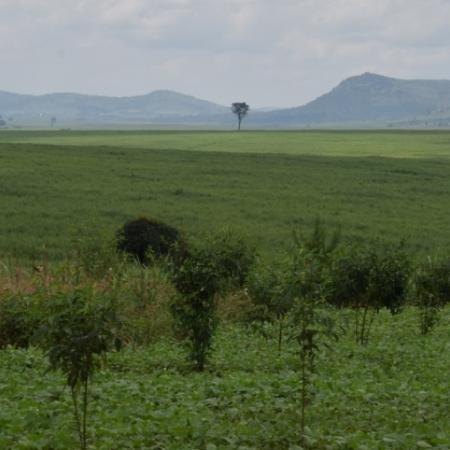
The Kiiha catchment is a biodiverse area of wetlands, communally owned forests, and private and public land. Its ecosystems is threatened by industrial developments, increased immigration and subsequently land use change; which would have been exacerbated by Kinyara’s expansion plans. Although the company had already started investments in sustainable production, their efforts were primarily focused on wetlands and on the activities on the nucleus estate. With support from IUCN Netherlands Committee through the SRJS programme, Ecotrust engaged with the sugar company to show them how business as usual could threaten environmental and business sustainability, and broaden the scope of their sustainable production.
Ecotrust conducted research including Land Use and Land Cover maps and identified risks to the company’s production. These included losing wetlands on the company’s property due to encroachment through fires that nearby communities start to prepare land for agriculture, which also affects the connectivity between forests and wetlands. Ecotrust also explained to communities the importance of the wetlands and their ecosystem services, and the impacts that their use of fire could have on nature and on sugar fields. Aware of the people’s dependence on the land, the NGO helped develop alternative environmentally friendly livelihoods. Kinyara has reported that the rates at which sugarcane was lost to fires has reduced to almost zero; the incidence of illegal activities like alcohol distillation has dropped, and agriculture in the wetlands has stopped.
The Kiiha partnership, which gathered the Ugandan Directorate of Water Resources Management, GIZ, Kinyara and Ecotrust, provided a platform for these stakeholders to discuss sustainability risks and gaps in sugarcane development, and use recommendations to address identified gaps and attain socio-economic and environmental standards of sugarcane production. These arguments and actions convinced Kinyara that sustainable practices equal business sustainability, and that they should adopt a landscape approach to conservation action. Kinyara also just provided financial support to two wetland associations, KIKAWECA and KAKAMUWECA, to restore 31.5 ha of land by planting more than 12,000 tree seedlings on the buffer line of the wetland.
Finally, Ecotrust will support Kinyara to adopt and implement the Kiiha Catchment Management Plan to ensure continuous sustainability efforts.
